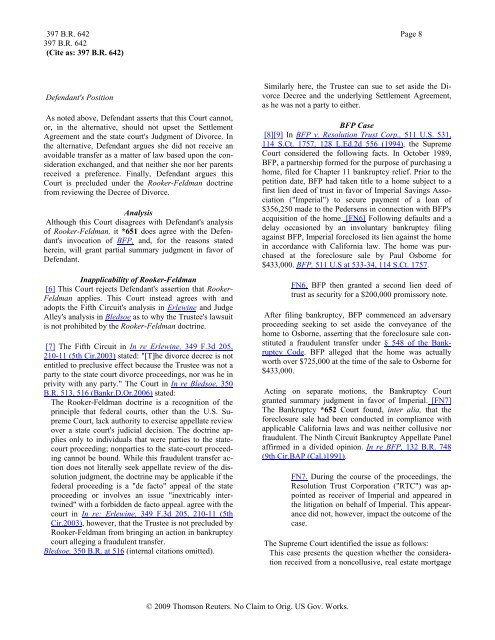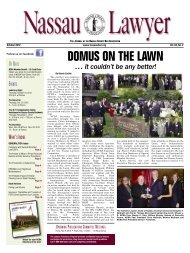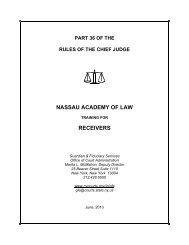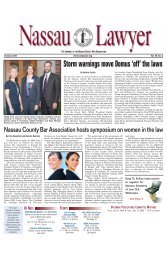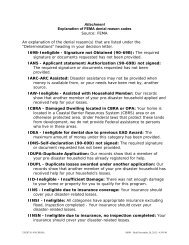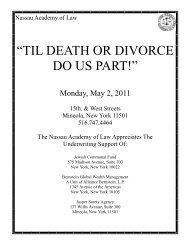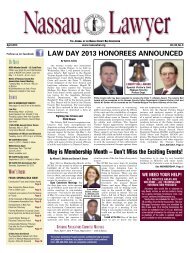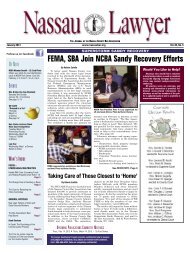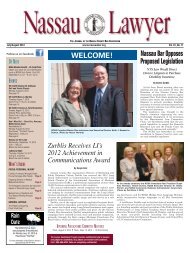397 B.R. 642 Page 7397 B.R. 642(Cite as: 397 B.R. 642)or future creditors, is fraudulent as to both present andfuture creditors.DCL § 276 (McKinney's 2008). The burden <strong>of</strong> provingthe "actual intent" <strong>of</strong> the transferor is on the party seekingto set aside the conveyance. This intent must be establishedby clear and convincing evidence. "[A]ctual intentto defraud must be proven by the party seeking to setaside the conveyance by clear and convincing evidence."McCombs, 30 F.3d at 328 (citing Marine Midland Bank v.Murk<strong>of</strong>f, 120 A.D.2d 122, 126, 508 N.Y.S.2d 17, 20 (2dDep't 1986) and ACLI Gov't Sec. v. Rhoades, 653 F.Supp.1388, 1394 (S.D.N.Y.1987)).[5] Actual intent to defraud is rarely susceptible to directpro<strong>of</strong>. Therefore, the Second Circuit Court <strong>of</strong> Appeals hasenumerated certain "badges <strong>of</strong> fraud" which can establishactual intent. The nonexclusive list <strong>of</strong> badges <strong>of</strong> fraudincludes:1. lack or inadequacy <strong>of</strong> consideration;2. family, friendship or close associate relationship betweenthe parties;3. retention <strong>of</strong> possession, benefit or use <strong>of</strong> the propertyin question by the debtor;4. the financial condition <strong>of</strong> the transferor before andafter the transfer in question;5. the existence or cumulative effect <strong>of</strong> a pattern or series<strong>of</strong> transactions or course <strong>of</strong> conduct after the debt isincurred, the onset <strong>of</strong> financial difficulties, or pendency<strong>of</strong> threat <strong>of</strong> suits by creditors; and6. the chronology <strong>of</strong> the events and transactions underinquiry.See Salomon v. Kaiser (In re Kaiser), 722 F.2d 1574,1582-83 (2d Cir.1983).In his Complaint, the Trustee seeks recovery under DCLSections 278 and 279. Section 278 sets forth the rights <strong>of</strong>creditors whose claims have matured, and provides:1. Where a conveyance or obligation is fraudulent as toa creditor, such creditor, when his claim has matured,may, as against any person except a purchaser for fairconsideration without knowledge *650 <strong>of</strong> the fraud atthe time <strong>of</strong> the purchase, or one who has derived titleimmediately or mediately from such a purchaser,a. Have the conveyance set aside or obligation annulledto the extent necessary to satisfy his claim, orb. Disregard the conveyance and attach or levy executionupon the property conveyed.2. A purchaser who without actual fraudulent intent hasgiven less than a fair consideration for the conveyanceor obligation, may retain the property or obligation assecurity for repayment.DCL § 278 (McKinney's 2008).DCL Section 279 articulates the relief available to creditorswhose claims have not matured, and provides:Where a conveyance made or obligation incurred isfraudulent as to a creditor whose claim has not maturedhe may proceed in a court <strong>of</strong> competent jurisdictionagainst any person against whom he could have proceededhad his claim matured, and the court may,a. Restrain the defendant from disposing <strong>of</strong> his property.b. Appoint a receiver to take charge <strong>of</strong> the property,c. Set aside the conveyance or annul the obligation, ord. Make any order which the circumstances <strong>of</strong> the casemay require.DCL § 279 (McKinney's 2008).The Transfer <strong>of</strong> the Marital Residence and the Exchange<strong>of</strong> ConsiderationThe Trustee's PositionThe Trustee first asserts that this Court can, and should,independently review the Settlement Agreement and theJudgment <strong>of</strong> Divorce to determine if the Debtor made afraudulent transfer, or if the Defendant received a preference.Defendant argues by analogy to BFP v. ResolutionTrust Corp., 511 U.S. 531, 114 S.Ct. 1757, 128 L.Ed.2d556 (1994), that a state court divorce settlement andjudgment are not subject to review by a bankruptcy courtunder Section 548 without pro<strong>of</strong> <strong>of</strong> collusion or extrinsicfraud. The Trustee rejects this position, and relies upon,inter alia, In re Stinson, 364 B.R. 278(Bankr.W.D.Ky.2007) and In re Hill, 342 B.R. 183(Bankr.N.J.2006).The Trustee also alleges that the Debtor did not receivereasonably equivalent value under Bankruptcy Code §548 for his interest in the Marital Residence, that theDebtor did not receive fair consideration under DCL §§273, 278 and 279, that Defendant received a preferenceunder Bankruptcy Code § 547, and that Defendant's parentsreceived an insider preference under § 547.The Trustee also alleges the Transfer was made by theDebtor with actual intent to hinder, delay or defraud underDCL §§ 276, 278 and 279. However, the Trustee has notprovided any evidence that the Transfer was made by theDebtor with actual intent to hinder, delay or defraud, norhas the Trustee provided any evidence that the Debtor andDefendant entered into a conspiracy or colluded to defraudcreditors <strong>of</strong> Debtor.© 2009 Thomson Reuters. No Claim to Orig. US Gov. Works.
397 B.R. 642 Page 8397 B.R. 642(Cite as: 397 B.R. 642)Defendant's PositionAs noted above, Defendant asserts that this Court cannot,or, in the alternative, should not upset the SettlementAgreement and the state court's Judgment <strong>of</strong> Divorce. Inthe alternative, Defendant argues she did not receive anavoidable transfer as a matter <strong>of</strong> law based upon the considerationexchanged, and that neither she nor her parentsreceived a preference. Finally, Defendant argues thisCourt is precluded under the Rooker-Feldman doctrinefrom reviewing the Decree <strong>of</strong> Divorce.AnalysisAlthough this Court disagrees with Defendant's analysis<strong>of</strong> Rooker-Feldman, it *651 does agree with the Defendant'sinvocation <strong>of</strong> BFP, and, for the reasons statedherein, will grant partial summary judgment in favor <strong>of</strong>Defendant.Inapplicability <strong>of</strong> Rooker-Feldman[6] This Court rejects Defendant's assertion that Rooker-Feldman applies. This Court instead agrees with andadopts the Fifth Circuit's analysis in Erlewine and JudgeAlley's analysis in Bledsoe as to why the Trustee's lawsuitis not prohibited by the Rooker-Feldman doctrine.[7] The Fifth Circuit in In re Erlewine, 349 F.3d 205,210-11 (5th Cir.2003) stated: "[T]he divorce decree is notentitled to preclusive effect because the Trustee was not aparty to the state court divorce proceedings, nor was he inprivity with any party." The Court in In re Bledsoe, 350B.R. 513, 516 (Bankr.D.Or.2006) stated:The Rooker-Feldman doctrine is a recognition <strong>of</strong> theprinciple that federal courts, other than the U.S. SupremeCourt, lack authority to exercise appellate reviewover a state court's judicial decision. The doctrine appliesonly to individuals that were parties to the statecourtproceeding; nonparties to the state-court proceedingcannot be bound. While this fraudulent transfer actiondoes not literally seek appellate review <strong>of</strong> the dissolutionjudgment, the doctrine may be applicable if thefederal proceeding is a "de facto" appeal <strong>of</strong> the stateproceeding or involves an issue "inextricably intertwined"with a forbidden de facto appeal. agree with thecourt in In re: Erlewine, 349 F.3d 205, 210-11 (5thCir.2003), however, that the Trustee is not precluded byRooker-Feldman from bringing an action in bankruptcycourt alleging a fraudulent transfer.Bledsoe, 350 B.R. at 516 (internal citations omitted).Similarly here, the Trustee can sue to set aside the DivorceDecree and the underlying Settlement Agreement,as he was not a party to either.BFP Case[8][9] In BFP v. Resolution Trust Corp., 511 U.S. 531,114 S.Ct. 1757, 128 L.Ed.2d 556 (1994), the SupremeCourt considered the following facts. In October 1989,BFP, a partnership formed for the purpose <strong>of</strong> purchasing ahome, filed for Chapter 11 bankruptcy relief. Prior to thepetition date, BFP had taken title to a home subject to afirst lien deed <strong>of</strong> trust in favor <strong>of</strong> Imperial Savings Association("Imperial") to secure payment <strong>of</strong> a loan <strong>of</strong>$356,250 made to the Pedersens in connection with BFP'sacquisition <strong>of</strong> the home. [FN6] Following defaults and adelay occasioned by an involuntary bankruptcy filingagainst BFP, Imperial foreclosed its lien against the homein accordance with California law. The home was purchasedat the foreclosure sale by Paul Osborne for$433,000. BFP, 511 U.S at 533-34, 114 S.Ct. 1757.FN6. BFP then granted a second lien deed <strong>of</strong>trust as security for a $200,000 promissory note.After filing bankruptcy, BFP commenced an adversaryproceeding seeking to set aside the conveyance <strong>of</strong> thehome to Osborne, asserting that the foreclosure sale constituteda fraudulent transfer under § 548 <strong>of</strong> the BankruptcyCode. BFP alleged that the home was actuallyworth over $725,000 at the time <strong>of</strong> the sale to Osborne for$433,000.Acting on separate motions, the Bankruptcy Courtgranted summary judgment in favor <strong>of</strong> Imperial. [FN7]The Bankruptcy *652 Court found, inter alia, that theforeclosure sale had been conducted in compliance withapplicable California laws and was neither collusive norfraudulent. The Ninth Circuit Bankruptcy Appellate Panelaffirmed in a divided opinion. In re BFP, 132 B.R. 748(9th Cir.BAP (Cal.)1991).FN7. During the course <strong>of</strong> the proceedings, theResolution Trust Corporation ("RTC") was appointedas receiver <strong>of</strong> Imperial and appeared inthe litigation on behalf <strong>of</strong> Imperial. This appearancedid not, however, impact the outcome <strong>of</strong> thecase.The Supreme Court identified the issue as follows:This case presents the question whether the considerationreceived from a noncollusive, real estate mortgage© 2009 Thomson Reuters. No Claim to Orig. US Gov. Works.
- Page 1 and 2:
Nassau Academy of LawCLE Live Class
- Page 3 and 4:
McKinney's Debtor and Creditor Law
- Page 5 and 6:
McKinney's Debtor and Creditor Law
- Page 7 and 8:
McKinney's Debtor and Creditor Law
- Page 9 and 10:
McKinney's Debtor and Creditor Law
- Page 11 and 12:
McKinney's Debtor and Creditor Law
- Page 13 and 14:
McKinney's Debtor and Creditor Law
- Page 15 and 16:
McKinney's Debtor and Creditor Law
- Page 17 and 18:
McKinney's Debtor and Creditor Law
- Page 19 and 20:
BAKER & HOSTETLER LLP45 Rockefeller
- Page 21 and 22:
usiness of defendant Bernard L. Mad
- Page 23 and 24:
BACKGROUND, THE TRUSTEE, AND STANDI
- Page 25 and 26:
Madoff who received fraudulent tran
- Page 27 and 28:
ased on fictitious profits and for
- Page 29 and 30:
28. BLMIS funds were also used to p
- Page 31 and 32:
Madoff, and her niece, Shana Madoff
- Page 33 and 34:
42. Ruth Madoff was never an employ
- Page 35 and 36:
FIRST CAUSE OF ACTIONTURNOVER AND A
- Page 37 and 38:
66. At the time of each of the Two-
- Page 39 and 40:
Transfers; (b) directing that the S
- Page 41 and 42:
EIGHTH CAUSE OF ACTIONUNDISCOVERED
- Page 43 and 44:
TENTH CAUSE OF ACTIONDISALLOWANCE O
- Page 45 and 46:
111. Mrs. Madoff benefited from the
- Page 47 and 48: WHEREFORE, the Trustee respectfully
- Page 49 and 50: 2(c)(3): (a) preserving the Subsequ
- Page 51 and 52: 302 B.R. 760 Page 1302 B.R. 760(Cit
- Page 53 and 54: 302 B.R. 760 Page 3302 B.R. 760(Cit
- Page 55 and 56: 302 B.R. 760 Page 5302 B.R. 760(Cit
- Page 57 and 58: 302 B.R. 760 Page 7302 B.R. 760(Cit
- Page 59 and 60: 302 B.R. 760 Page 9302 B.R. 760(Cit
- Page 61 and 62: 302 B.R. 760 Page 11302 B.R. 760(Ci
- Page 63 and 64: 302 B.R. 760 Page 13302 B.R. 760(Ci
- Page 65 and 66: 302 B.R. 760 Page 15302 B.R. 760(Ci
- Page 67 and 68: 302 B.R. 760 Page 17302 B.R. 760(Ci
- Page 69 and 70: 302 B.R. 760 Page 19302 B.R. 760(Ci
- Page 71 and 72: 394 B.R. 721 Page 1394 B.R. 721, 50
- Page 73 and 74: 394 B.R. 721 Page 3394 B.R. 721, 50
- Page 75 and 76: 394 B.R. 721 Page 5394 B.R. 721, 50
- Page 77 and 78: 394 B.R. 721 Page 7394 B.R. 721, 50
- Page 79 and 80: 394 B.R. 721 Page 9394 B.R. 721, 50
- Page 81 and 82: 394 B.R. 721 Page 11394 B.R. 721, 5
- Page 83 and 84: 394 B.R. 721 Page 13394 B.R. 721, 5
- Page 85 and 86: 394 B.R. 721 Page 15394 B.R. 721, 5
- Page 87 and 88: 394 B.R. 721 Page 17394 B.R. 721, 5
- Page 89 and 90: 394 B.R. 721 Page 19394 B.R. 721, 5
- Page 91 and 92: 394 B.R. 721 Page 21394 B.R. 721, 5
- Page 93 and 94: 397 B.R. 642 Page 2397 B.R. 642(Cit
- Page 95 and 96: 397 B.R. 642 Page 4397 B.R. 642(Cit
- Page 97: 397 B.R. 642 Page 6397 B.R. 642(Cit
- Page 101 and 102: 397 B.R. 642 Page 10397 B.R. 642(Ci
- Page 103 and 104: 397 B.R. 642 Page 12397 B.R. 642(Ci
- Page 105 and 106: 397 B.R. 642 Page 14397 B.R. 642(Ci
- Page 107 and 108: 443 F.3d 180 Page 2443 F.3d 180(Cit
- Page 109 and 110: 443 F.3d 180 Page 4443 F.3d 180(Cit
- Page 111 and 112: 443 F.3d 180 Page 6443 F.3d 180(Cit
- Page 113 and 114: 443 F.3d 180 Page 8443 F.3d 180(Cit
- Page 115 and 116: 443 F.3d 180 Page 10443 F.3d 180(Ci
- Page 117 and 118: 443 F.3d 180 Page 12443 F.3d 180(Ci
- Page 119 and 120: Page 2257 A.D.2d 526, 684 N.Y.S.2d
- Page 121 and 122: Page 4257 A.D.2d 526, 684 N.Y.S.2d
- Page 123 and 124: Page 6257 A.D.2d 526, 684 N.Y.S.2d
- Page 125 and 126: 770 N.Y.S.2d 421 Page 22 A.D.3d 780
- Page 127 and 128: Page 14 A.D.3d 495, 773 N.Y.S.2d 71
- Page 129: Page 34 A.D.3d 495, 773 N.Y.S.2d 71
- Page 132 and 133: 780 N.Y.S.2d 409 Page 29 A.D.3d 553
- Page 134 and 135: Page 134 A.D.3d 231, 824 N.Y.S.2d 3
- Page 136 and 137: Page 334 A.D.3d 231, 824 N.Y.S.2d 3
- Page 138 and 139: Page 2991 F.2d 31(Cite as: 991 F.2d
- Page 140 and 141: Page 4991 F.2d 31(Cite as: 991 F.2d
- Page 142 and 143: Page 6991 F.2d 31(Cite as: 991 F.2d
- Page 144 and 145: FRAUDULENT TRANFERENCESRonald M. Te
- Page 146 and 147: Nursing home case_ Transfer of pers
- Page 148 and 149:
Sections 548 and 544 work in concer
- Page 150 and 151:
U.S. Supreme CourtBFP v. Resolution
- Page 152 and 153:
example, from net 15 to COD; or cha
- Page 154 and 155:
Bankruptcy Code Section§ 548. Frau
- Page 156:
Ron Terenzi is a founding partner a


